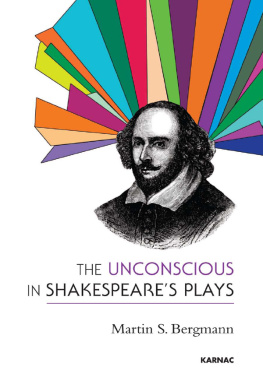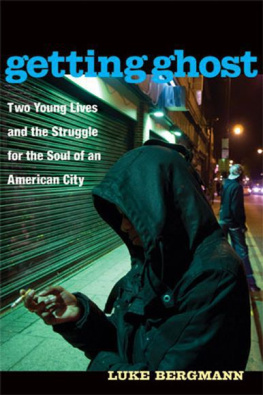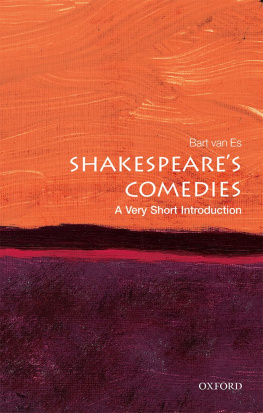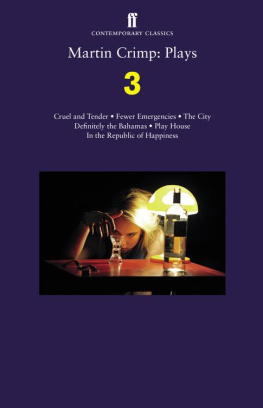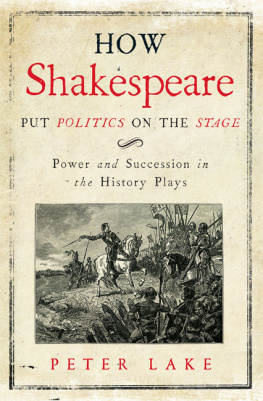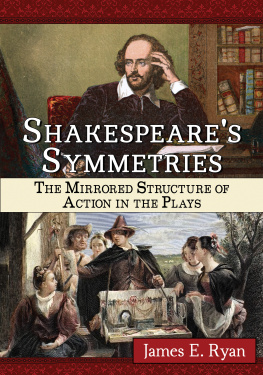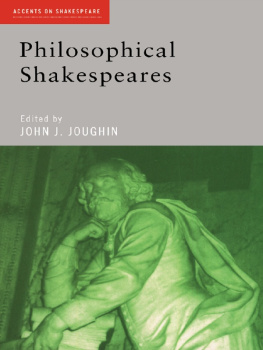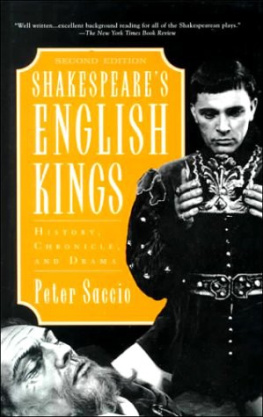Bergmann Martin S. - The Unconscious in Shakespeares Plays
Here you can read online Bergmann Martin S. - The Unconscious in Shakespeares Plays full text of the book (entire story) in english for free. Download pdf and epub, get meaning, cover and reviews about this ebook. City: London Routledge, year: 2019, publisher: Karnac Books Ltd., genre: Children. Description of the work, (preface) as well as reviews are available. Best literature library LitArk.com created for fans of good reading and offers a wide selection of genres:
Romance novel
Science fiction
Adventure
Detective
Science
History
Home and family
Prose
Art
Politics
Computer
Non-fiction
Religion
Business
Children
Humor
Choose a favorite category and find really read worthwhile books. Enjoy immersion in the world of imagination, feel the emotions of the characters or learn something new for yourself, make an fascinating discovery.
- Book:The Unconscious in Shakespeares Plays
- Author:
- Publisher:Karnac Books Ltd.
- Genre:
- Year:2019
- City:London Routledge
- Rating:5 / 5
- Favourites:Add to favourites
- Your mark:
- 100
- 1
- 2
- 3
- 4
- 5
The Unconscious in Shakespeares Plays: summary, description and annotation
We offer to read an annotation, description, summary or preface (depends on what the author of the book "The Unconscious in Shakespeares Plays" wrote himself). If you haven't found the necessary information about the book — write in the comments, we will try to find it.
The Unconscious in Shakespeares Plays — read online for free the complete book (whole text) full work
Below is the text of the book, divided by pages. System saving the place of the last page read, allows you to conveniently read the book "The Unconscious in Shakespeares Plays" online for free, without having to search again every time where you left off. Put a bookmark, and you can go to the page where you finished reading at any time.
Font size:
Interval:
Bookmark:
Professor Martin S. Bergmann teaches a course on the history of psychoanalysis in the post-doctoral programme on psychoanalysis and psychotherapy at New York University. He is an honourary member of the American Psychoanalytic Association, an honourary fellow of the Post-Graduate Center for Mental Health, and a member of the International Psychoanalytical Association. His books include The Evolution of Psychoanalytic Technique (1976), Generations of the Holocaust (1982), The Anatomy of Loving (1987), In the Shadow of Moloch (1992), The Hartmann Era in Psychoanalysis (2000), and What Silent Love Hath Writ: A Psychoanalytic Exploration of Shakespeare's Sonnets (2008, with Michael Bergmann). He is the editor of Understanding Dissidence and Controversy in the History of Psychoanalysis (2004), which received the Gradiva Award from the National Association for the Advancement of Psychoanalysis. In 1997 he received the Sigourney Award for outstanding contributions to psychoanalysis, presented by the American Psychoanalytic Association, and in 1998 he received the Distinguished Psychoanalytic Educator Award from the International Federation for Psychoanalytic Education. In 2000 he delivered the Freud Anniversary Lecture to the New York Psychoanalytic Institute.
My first thanks go to my students, who participated in the seminar that carried the title of this book. Their readings of the plays and their willingness to speculate about the role of the unconscious in each play became its foundation. The students arrived at their own interpretations of every play and then criticised my interpretations. They convinced me that reading Shakespeare's plays contributes depth to a therapist's psychoanalytic education.
My gratitude also goes to my wife, who read every chapter and made many valuable suggestions. I also profited from discussing my findings with my son Michael. Special thanks are due to my assistant, Karen Duda, who typed and retyped these chapters and shared her interest in this book.
I owe a very different kind of thanks to the Shakespeare scholars, whose books I read and consulted. I often disagreed with their conclusions, but their work helped me to reach a wider and deeper understanding of the plays. The books I regularly consulted were Shakespearean Tragedy (A. C. Bradley, 1904), Shakespeare: The Invention of the Human (H. Bloom, 1998), Shakespeare's Language (F. Kermode, 2000), Shakespeare After All (M. Garber, 2004), Will in the World (S. Greenblatt, 2004), Shakespeare's Philosophy (C. McGinn, 2006), and Shakespeare the Thinker (A. D. Nuttal, 2007).
It gives me great pleasure to acknowledge the help I received from Dr. Catherine Haran (Mrs. Otto Kernberg). She was visiting her relatives in Ireland and mentioned this book, and they told her about a book published by J. C. Bucknill, M.D., FRC, written in 1861, The Mad Folk of Shakespeare. One of the aims of my book is to illustrate how differently psychoanalysis enables us to understand Shakespeare's plays and Bucknill's book is astonishing because it shows how deeply a psychiatrist writing before Freud understood Shakespeare.
T his chapter on Hamlet carries a special responsibility in this book. It is Shakespeare's deepest and psychologically most complex play as well as the longest running at nearly 4000 words. It is one of the greatest works of world literature. Hamlet contains more than 600 words not found in previous works by Shakespeare and new to the English language (Greenblatt, 2004: p. 308). Shakespeare needed new words, mostly to express psychological concepts not put into words before. Previous tragedies had already established Shakespeare as an eminent playwright but Hamlet is a milestone in the exploration of human interiority. A psychological study of the new words Shakespeare created could be an enriching experience.
We compare Hamlet to an earlier Shakespeare character, Richard III. There is nothing ultimately mysterious about Richard, whereas we never fully understand Hamlet. Shakespeare made the discovery that characters are more interesting and lead richer inner lives when they do not fully know themselves.
Hamlet is also the first work of literature to receive a special psychoanalytic interpretation, establishing the first bridge between psychoanalysis, a method of cure for mental illness, and world literature. In this book it will also be used to establish the difference between the psychoanalytic interpretation and other interpretations.
Freud made his famous interpretation of Hamlet's inability to carry out the command of his father's ghost in a letter to his friend Wilhelm Fliess on 15 October 1897 (Masson, 1985) and published it in his book The Interpretation of Dreams in 1900. Hamlet's paralysis of action was unconsciously based on the fact that he himself harboured the same wishes as his uncle: to kill his father and sexually possess his mother.
The play has been of special interest to psychoanalysts. First, while any significant work of literature can be interpreted from a psychoanalytic point of view, Hamlet seems to demand such an interpretation because Hamlet's inability to carry out the ghost's command to kill his uncle points to an unconscious conflict that psychoanalysis can explain.
The second reason is historical: when Freud first communicated his great discovery of the Oedipus complex to Fliess on 15 October 1897 he included the following observation:
I have found, in my own case too, [the phenomenon of] being in love with my mother and jealous of my father, and I now consider it a universal event in early childhood. If this is so, we can understand the gripping power of Oedipus Rex. the Greek legend seizes upon a compulsion which everyone recognizes because he senses its existence within himself. Everyone in the audience was once a budding Oedipus in fantasy and each recoils in horror from the dream fulfillment here transplanted into reality, with the full quantity of repression which separates his infantile state from his present one. (Masson, 1985: p. 272)
Since the discovery of the Oedipus complex ranks as Freud's single greatest discovery, this letter can claim to represent the birthday of psychoanalysis. It clearly shows that in his self-analysis Freud did not reach the full oedipal wish, only a mild derivative of it. What enabled Freud to discover the raw Oedipus complex was his familiarity with Oedipus Rex. In the same letter, Freud goes on to include Hamlet.
Fleetingly the thought passed through my head that the same thing might be at the bottom of Hamlet as well. I am not thinking of Shakespeare's conscious intention, but believe, rather, that a real event stimulated the poet to his representation, in that his unconscious understood the unconscious of his hero. How does Hamlet the hysteric justify his words, Thus conscience does make cowards of us all? How does he explain his irresolution in avenging his father by the murder of his unclethe same man who sends his courtiers to their death without a scruple and who is positively precipitate in murdering Laertes? [This was a slip on Freud's part. Hamlet actually murders Polonius; Laertes later challenges Hamlet to the duel in which both are killed.] How better than through the torment he suffers from the obscure memory that he himself had contemplated the same deed against his father out of passion for his mother, anduse every man after his desert, and who should scape whipping? His conscience is his unconscious sense of guilt. And is not his sexual alienation in his conversation with Ophelia typically hysterical? And his rejection of the instinct that seeks to beget children? And, finally, his transferral of the deed from his own father to Ophelia's? And does he not in the end, in the same marvelous way as my hysterical patients, bring down punishment on himself by suffering the same fate as his father of being poisoned by the same rival? (ibid. pp. 272273)
Font size:
Interval:
Bookmark:
Similar books «The Unconscious in Shakespeares Plays»
Look at similar books to The Unconscious in Shakespeares Plays. We have selected literature similar in name and meaning in the hope of providing readers with more options to find new, interesting, not yet read works.
Discussion, reviews of the book The Unconscious in Shakespeares Plays and just readers' own opinions. Leave your comments, write what you think about the work, its meaning or the main characters. Specify what exactly you liked and what you didn't like, and why you think so.

